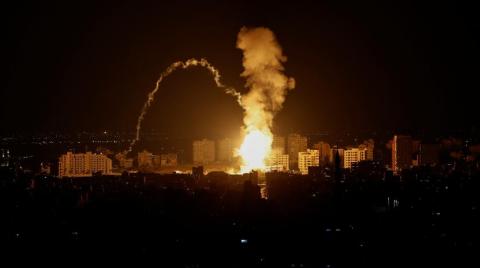
A Palestinian hunger striker died in Israeli custody on Tuesday, sparking an exchange of fire between Israel and armed groups in Gaza, before three Palestinian officials said the sides had agreed to a ceasefire.
Earlier, Israeli jets struck in Gaza as armed groups there fired rocket barrages toward Israel in response to the death of Khader Adnan, a prominent political leader of the Palestinian Islamic Jihad faction, following an 87-day hunger
strike in an Israeli prison.
Adnan, who was awaiting trial, was found unconscious in his cell and taken to a hospital, where he was declared dead after efforts to revive him, Israel's Prisons Service said. He was the first Palestinian hunger striker to die in Israeli custody in more than 30 years.
Hundreds of people took to the streets in the occupied Palestinian territories to rally and mourn Adnan's death, which Palestinian leaders described as an assassination.
In Gaza, an umbrella group of armed Palestinian factions including Hamas and Islamic Jihad claimed responsibility for a series of rocket salvos fired towards Israel during the day.
The Israeli military said it identified at least 30 rocket launches that set off sirens in southern Israel including in Ashkelon, about 14 km (9 miles) north of Gaza, and sent people running to bomb shelters.
Two rockets landed in the small Israeli city of Sderot just east of Gaza, wounding three people, including a 25-year-old foreign national who Israel's ambulance service said sustained serious shrapnel wounds.
Late on Tuesday, plumes of smoke spiraled into the night sky and explosions could be heard as the Israeli military said it hit targets across Gaza including weapons manufacturing sites and training camps of Hamas, the group that governs Gaza.
Islamic Jihad spokesman Tareq Selmi said fighting had ended by dawn Wednesday. Two Palestinian officials said Egypt, Qatar and the United Nations helped secure a "reciprocal and simultaneous" ceasefire that largely seemed to hold.
Adnan first grabbed international headlines and inspired solidarity protests over a decade ago, when he staged a 66-day hunger strike against his administrative detention. That galvanized hundreds of other prisoners to join the strike, which ended with a deal for his release. He was later arrested again.
With violence surging over the past year and the Israeli military launching near-nightly arrest raids in the West Bank, the number of Palestinians in administrative detention has swelled to the highest number in two decades.












